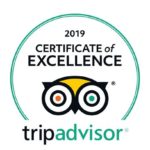Scouts and Nonprofits Information
WRO is the go-to source for religious groups, Scouts, and other nonprofit organizations around the Midwest when they’re considering offering a canoe trip to their members. Whether it’s a single or multiday canoe/kayak rental, or a fully outfitted guided trip for 2 or more days, WRO brings experience and quality gear that can’t be found anywhere else.
We understand that you can certainly bring quite the groups! Never fear, getting folks on the water is what we do. Our attitude is the more people we can get on the water, the better place the world will be.
Rental Rates
Our special discounted Scout/Nonprofit rate is based on a discount from our regular, multiboat canoe or kayak rate, with a minimum of 5 boats. You will paddle the same high quality roylex Wenonah canoes as our other customers and will also get a more comfortable PFD to wear instead of the “Mae West” orange life vests, while supplies last. Please contact us regarding trips ending downriver from Boscobel.
WRO Scout/Nonprofit Rate Policy
We’re proud to offer a discount to Scouts and Nonprofits (SN)! But, like with any great deal, we’ve needed to add some parameters to the special pricing so we’re prepared for your group and your trip runs smoothly.
- SN rates must be paid for at least 14 days prior to your departure.
- You may pay by check or with credit card. If paying by check, we need to receive it at least 10 days before your trip.
- Additions to your boat count within 7 days of departure will be at the regular price – please have firm numbers before that for the discount to apply to all boats.
- Like all of our customers, cancellations are for credit only, we HIGHLY recommend building Trip Cancellation Protection into the cost of your trip to cover last minute cancellations.
- All waivers must be signed electronically – once the reservation is paid the organizer will receive a confirmation email that contains a link to forward to each member of the group for esignature.
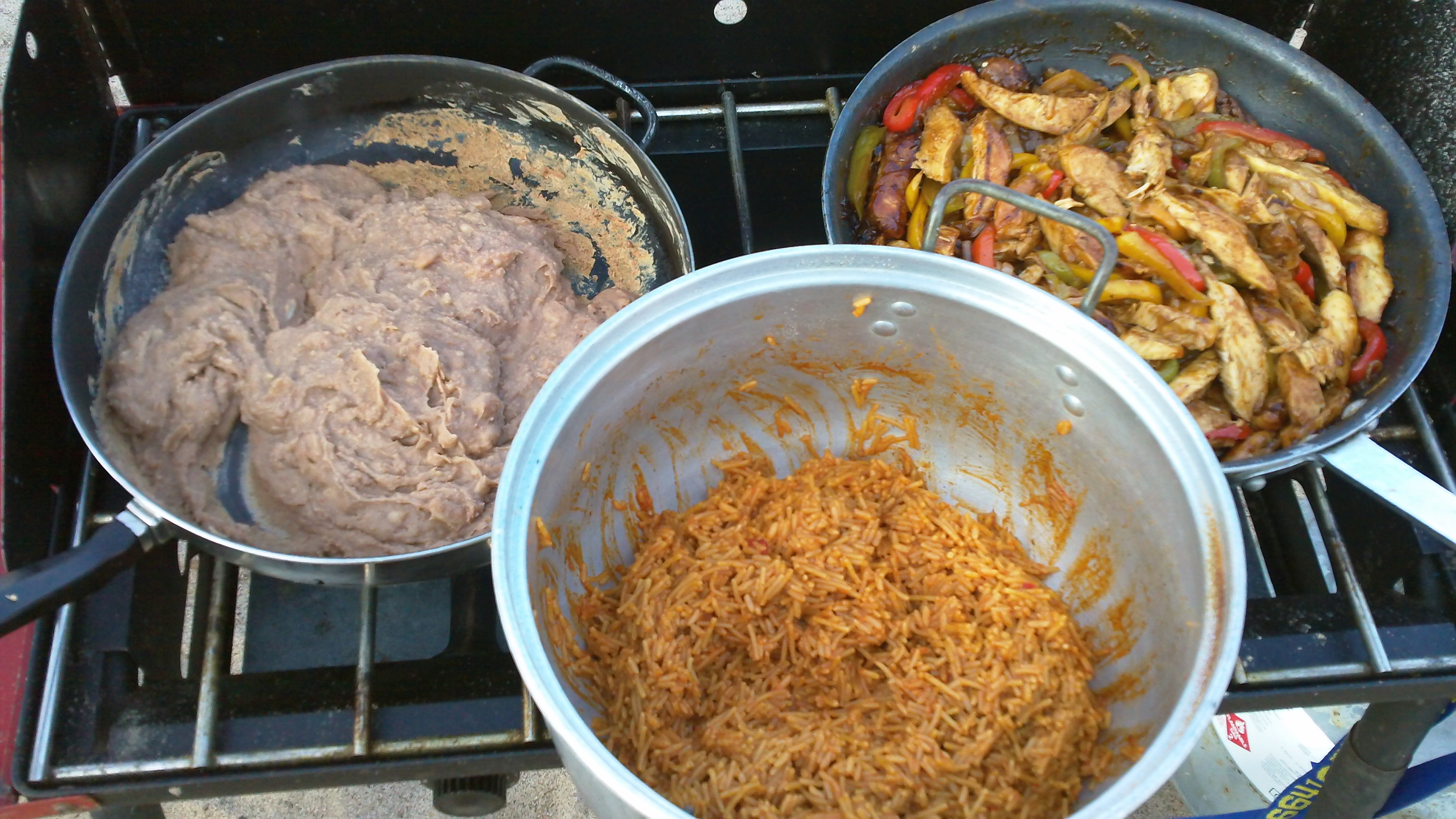
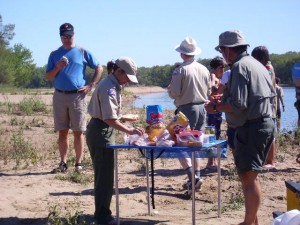
Scout and NonProfit Frequently Asked Questions
We do everything we can to keep our nonprofit rates to a minimum, while still providing a great value. Take time to check out our reviews on Google and our Facebook page – we work hard on our reputation. Don’t hesitate to send us an email or give us a call, 608.375.5300, if you have any questions. Download our 2022 pdf price sheet – check your downloads folder after clicking.
We sure do! First, thank you for taking on the responsibility of organizing the group – you make us happy:-)
We’ve put together a pdf doc of our 20 years of experience in watching these groups come together. Let us know if we’ve missed anything!
Barring issues like a head wind, we’d suggest 12-16 miles is what the average group will cover in a normal day. We’ve seen as high as 24 miles, cracking the whip with short stops and average river height conditions. We’ve also had a couple of groups that struggled to get 8 miles in a day…but we have our suspicions that they were an outlier for several reasons (too much time lounging?). Keep in mind our general rule, when you’re in the boats and on the water you’ll cover about 3 MPH. Be realistic…NO ONE spends 7 hours a day in the boats without being in shape and prepared for it. Most groups will spend about 4 hours of actual “on water” time on a trip.
Finally, if this is your first trip we can assure you that those in your group would rather finish the trip wishing they’d done more than blaming you for sending them on the Bataan Death March. You can do a longer trip next year!
Absolutely not! If you have any camping experience, and plan accordingly, it’s not at all unrealistic for you to do a 3 day for your first time out. As long as everyone has the correct mindset (it only takes one person to infect a group to want to paddle through and finish early), 3 days is a magical experience!
TIP: Cooler management! If you’re going to be on the river for three days you really need to think about cooler management. We HIGHLY recommend marking your coolers. Cooler #1 will be used from the start of your trip to roughly the halfway point. Cooler #2 is lashed closed and not opened for any reason until you get past the halfway point of the trip. Coolers that get opened don’t remain “coolers” for long.
TIP #2: Freeze as much of the contents of your cooler as you can – it will keep the entire cooler colder longer.
We require a 100% deposit with your reservation. Until your deposit is received, your trip is not confirmed.
Trip cancellations (either by WRO or customer) are for credit on a future trip only – unless you’ve purchased Trip Cancellation Protection.
If the river is over 17,000 cfs, your trip will be cancelled and you will be provided a credit, unless you’ve purchased Trip Cancellation Protection.
We reserve the right to alter your trip due to weather or river conditions. Once your paddle hits the water there are no credits or refunds.
Our credo is simple. We want everyone we put on the river to enjoy themselves and come back. We also want to give people the Wisconsin River sand bar experience we know everyone treasures and expects.
You can either book online or give us a call at 608.375.5300, and we’ll get your reservation set up.
See the FULL Cancellation Policy
Yeah…no. We’re sorry, it’s not. Our rentals are based on calendar days – Saturday would be day 1, Sunday would be day 2. By dropping in your dates into our reservation system it will provide you with the cost of your trip.
First, be sure the use the Tripinator at the top of our homepage for trip suggestions.
In general, you’ll cover 3 miles per hour for the time you’re on the water (not sitting on a sand bar, as grandpa used to say, “sucking on Blue.” Pabst Blue Ribbon, get it?), this of course doesn’t factor in the day that you have a steady 13 mph headwind. So, if you’re thinking you want to paddle for 6 total hours over 2 days, times 3 mph…you’re looking at roughly an 18 mile trip. We have two options, a 16 mile (Muscoda to Boscobel) and 23 mile (Gotham to Boscobel) trip for you to choose from.
For the most part our trips either terminate in Boscobel or start in Boscobel and head towards the Mississippi River (for longer trips it’s possible to do a combo of up/down river trips). If this is your first trip with us we suggest you look at trips that terminate in Boscobel. Also, we highly recommend that if you’re torn between two trips, choose the one with a lesser distance – you’re better off finishing and wishing you’d done more than thinking it was never going to end. Also, if you’re going with a group of folks who’ve never canoe-camped, go with a shorter distance as they may not be as enthusiastic as you are. 🙂
Tips
In “normal” water levels in July and August, fishing in the early morning and evening should be pretty…dare we say, “easy.” Look for a sand bar drop off and work it. If you can find some structure, like a downed tree, even better. We’re big fans of Mepp’s (or single blade spinners) for small mouth and jigs for walleye and sauger – live bait is also an option. You’ll also find catfish, strippers, musky, northern, sturgeon and a whole bunch of others. Here are some additional tips.
Unless you are an accomplished fisherperson, we HIGHLY recommend you bring other food options with you, and, if you catch any fish, you can make yourself a hearty meal over a roaring fire.
Fishing Licenses
Right across the street from our shop is Tall Tails, they sell fishing/hunting licenses as well as adult beverages (Remember: no glass on the river). Keep in mind, the person buying the license needs to be present to purchase one, which may not be the case if you drop your people off at your put in upriver. Plan ahead!
Buying online will be the best option for most folks. It’s a simple process, and you can print or keep the proof of purchase on your cellphone if you bring it with.
Fishing Tips and a Special Offer from Tall Tails
It is YOUR responsibility to be sure that you’re complying with all fishing laws and regulations; ensure that you understand what size fish must be to keep. Our stretch of the river is patrolled by the DNR.
Download the pdf (check your download folder).
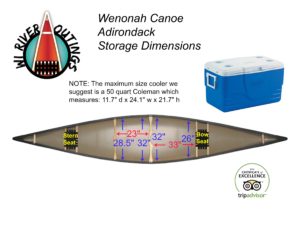
We generally open at 9 AM and based on the month and day of the week the first shuttle upriver is either 9 or 10 AM.
Keeping in mind that we need to get you on the water with enough time for you to find a sand bar and hopefully get your tent up before dark, our cut-off time to drive you upriver is generally 3 PM. Arriving past the last departure will incur an additional charge.
Staying in touch with us on the day of your trip will help us provide you with as quick a turnaround from the time you arrive at our shop to when we get you on the road heading upriver to your put-in as possible. If you’re running late, please let us know!
NOTE: Long distance trips (Sauk City and Arena) have specific departure times and must leave on time, call for additional information.
Assuming you’re finishing in Boscobel, you can finish as early as you like. However, we ask that you finish your trip by 6 PM so that if there’s some sort of an issue we still have daylight to help in guiding you to the finish. If you’re finishing downriver from Boscobel, arrangements will have been made prior to your departure for a pickup time.
PRO TIP: For the fastest turnaround time on Saturdays in July and August, AVOID arriving at our shop between 10:30 AM and 12:30 PM – this is when the bulk of our weekend paddlers arrive for their ride upriver. Remember, when you book your trip you are committing to a departure time from our shop. If the departure time is missed, you’ll be moved to the next departure time. Our shuttles MUST leave on time, no exceptions.
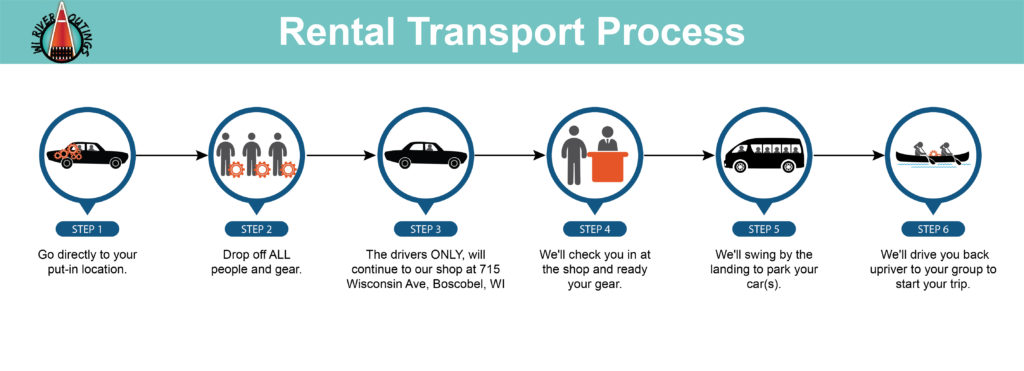
Drop people and gear at put-in first, then drivers only come to shop.
Oh, you KNOW it! PLEASE, if you rent nothing else from us, at least rent a dry bag! See our video on why you should rent a dry bag. NO ONE wants to sleep in a wet sleeping bag. Trash bags have a HUGE failure rate – don’t be a victim!
Here’s the entire list of items we have available for rent to make your paddle trip more comfortable.
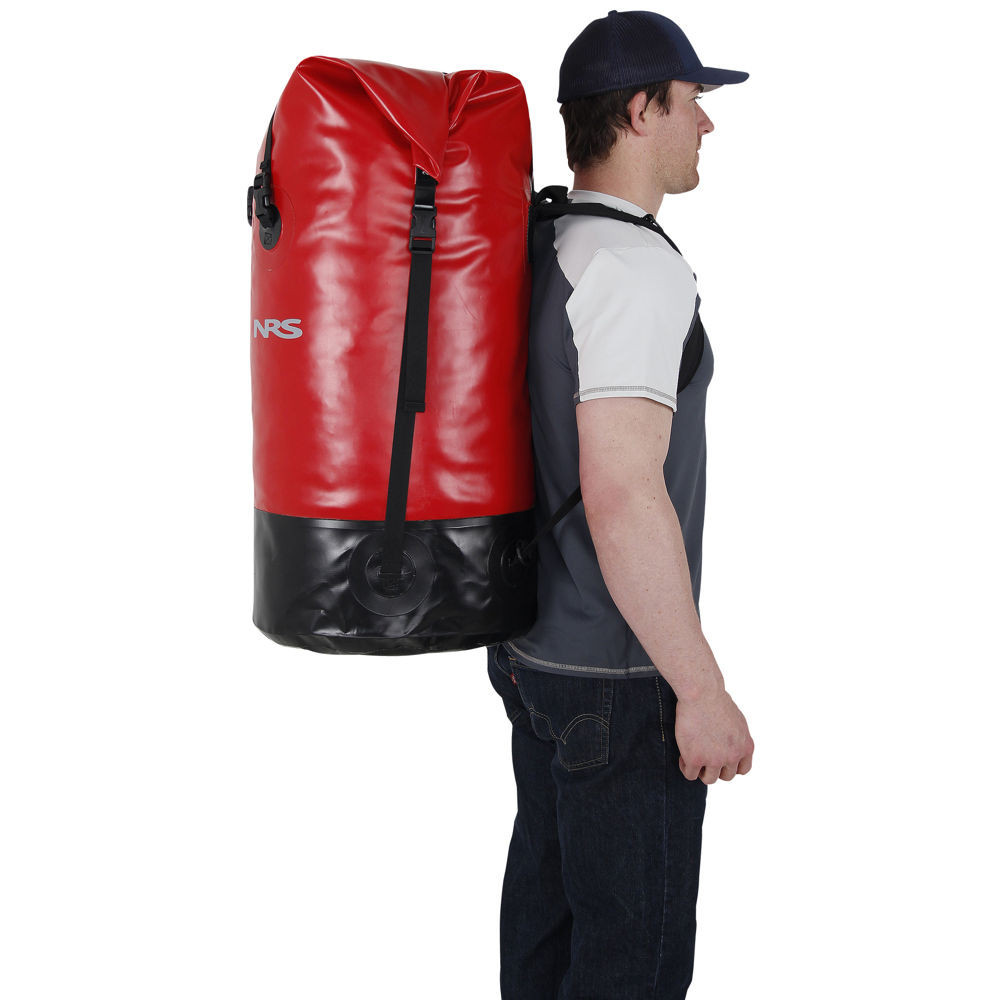
Our HUGE Dry Bag
You betcha! Someday these vids will be “classic retro” and we’ll be kewl again!
One day, when we have all sorts of time on our hands, we’ll finally sit down and write that perfect canoe camping meal planning and recipe book. Until then, this is a tough and broad question. You can keep things really simple: cereal (or granola and yogurt) for breakfast, sandwiches for lunch and dinner and snacks to fill you over the course of the day – no stove needed. Or, you can go hog wild: omelets (or eggs Benedict) for breakfast, deli sandwiches with all the fixin’s for lunch and steak and lobster with local sweet corn for dinner.
It all comes down to what gear you have and your desired efforts.
PRO TIP: Cook as much of your meal at home and simply warm it up on the river. Sloppy Joes, fajitas and pasta sauce are all great examples of “easy warmups” on the river.
Yes, really! When water levels are right, you’ll camp on a sand bar in the middle of the river. You are prohibited from camping on the shoreline – sand bars on the river only. The river is State land and, at present, you do not need a permit to camp on the sand bars. However, you do need to arrive by watercraft in order to be permitted to camp on the sand bars. Sand bars are first come, first served. While we operate on a MUCH less traveled portion of the river, you may find that you need to share a sand bar on a rare occasion (like during higher water) – get to know your neighbors, respect each other and enjoy!
We’re happy to move YOU up/downriver, but not your craft. While we transported personal vessels in the past, we have made the decision to cease the transport of personal watercraft (and all of your gear). If you have your own canoe/kayak that you’re looking to use, we ask you to drop it, your gear and additional people off at your chosen put-in, then the driver ONLY should come to our shop where we’ll check you in for a personal transport and shuttle you back to your group. Note that we do not do personal transports on Saturday in July and August until the afternoon. See the complete price list and process here.
We will not transport any inflated watercraft. You will either need to drop your inflated watercraft at your desired put-in before coming to our shop for your ride or arrive with it deflated and inflate it at the put-in after we drop you off.
We HIGHLY discourage you from filtering/boiling/using tablets with the water from the Wisconsin River – keep in mind it’s draining 1/3 of the Dairy State (we also are the 16th largest producer of hogs). We also believe purchasing single serving plastic water bottles produces too much trash. We recommend purchasing large jugs of water, or using a water tank of sorts, and simply filling personal water bottles as needed. There are a few options for filling water jugs during your trip. This is the safest way to go about providing drinking and cooking water for your group. See our list of boat landings and their amenities.
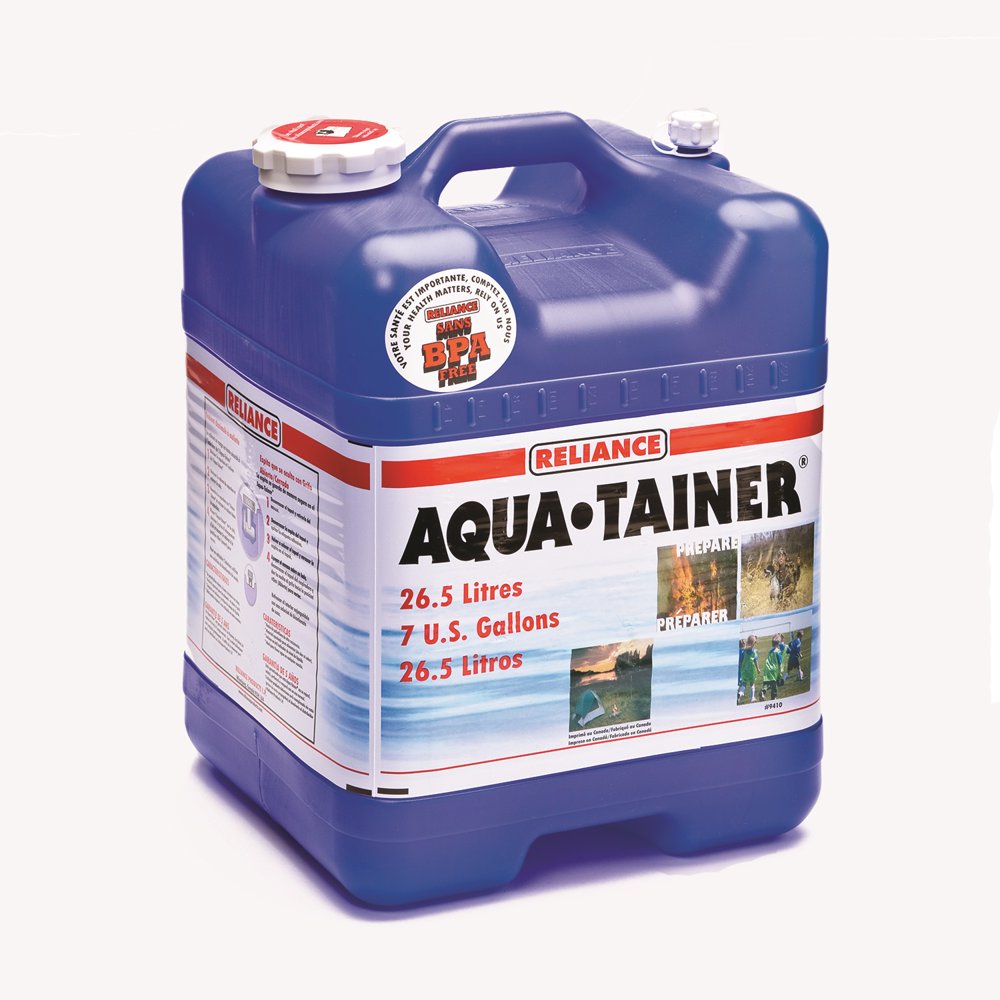
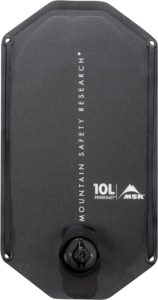
It’s happening everywhere due to cost cutting measures, safety, and abusive dumping: parks, cities, and even businesses are removing trash cans for public use. The Boscobel landing is a perfect example. It was roughly 2014 when the city decided it would no longer provide trash cans at the boat landing. If you do any camping, hiking, or paddling on state or federal land you’re familiar with “pack in/pack out,” and it’s understood that you’ll adhere to “Leave No Trace” principles and take out what you brought in. “Take only pictures and leave only footprints.”
So, the decision has been made, there are no trash cans at the landing. Here’s how you can reduce the volume of trash that you need to pack out:
- PLEASE, recycle what you can!
- If you’re passing the Muscoda landing – it still provides trash cans. Lighten your load along the way; ditch what you’ve got there.
- Packaging
- We see it all the time, a customer shows up with their brand-new do-hickie, and it’s still in the retail packaging. Recycle the packaging at home, otherwise you just added to the amount of trash you’re hauling around.
- If it came in a cardboard box…burn it as fire starter on your trip. PLEASE don’t burn plastic packaging – you will be ticketed for burning trash/littering if the DNR rolls up on your campsite and finds residue in your fire.
- Water bottles – Don’t buy the 24 pack of individual water bottles, buy two 1-gallon jugs. Better yet, the ultimate recycle/reuse, buy a Jerry Can and fill it up and dispense into smaller individual bottles like a Nalgene. WRO also rents Jerry Cans.
- Food Prep
- We’re big believers in preparing meals at home and simply warming them up on the river – this will eliminate a HUGE amount of trash by not going through the prep process while on the river.
- Avoid individually wrapped food/snacks inside a box…and bringing the box on the trip. Not only does it take up space at the start of your trip, you also end up adding to your trash heap at the end of your trip.
- Adult Beverages – NOTE: we’re not advocating alcohol consumption on the river, but we’re not naïve enough to think it doesn’t happen or suggest you stop doing it – so here’s some practical suggestions.
- Create a recycling bag of JUST aluminum – there are several organizations within Boscobel that would love to have them.
- We HIGHLY recommend using a growler that has been filled at your local brewery…or perhaps a local Wisconsin brewer.
- Reduce the volume you bring on the river in the first place – your objective should not be about getting PLOWED, it’s unsafe. Our opinion? It should be about a wee buzz. Remember: you’re on a moving river!
- Consider liquor instead of the volume of space needed for beer (this will save cooler space as well as trash). Remember – NO GLASS!
- Final tip – bring a high-quality trash bag! Generally, an inexpensive trash bag means thin plastic that can easily be punctured. A punctured bag is a leaky bag! If you can, go with a heavy-duty contractor 3 mil bag and you won’t be dripping all over the place.
Take some time and prepare for how you’re going to reduce the volume of trash you bring off the river. Just like our philosophy regarding the gear you bring – you’re only out there for a short period of time, it should be about what you can live without, pack light! It will be easier to drop off that small bag of trash at a gas station on the way home than a HUGE trash bag you can’t even fit in your car.
Over the years we’ve learned that if there isn’t a firm arrival time, customers can show up 6 hours late compared to the time they booked on their reservation. Our vans leave ON TIME. If you miss your departure time you will need to wait until the next departure (with the reservations for that departure time filling the van first and if there’s room we’ll get you on). If you missed the last departure of the day, there will be an additional fee to get you upriver or you can wait and depart the next day.
Transport is handled on the front end of your trip for all trips finishing in Boscobel, which allows most of our customers no-wait to finish their trip, load up, and head home (Land-Load-Leave). Follow these easy steps, and we’ll efficiently get you on the river.
If:
- Your trip is finishing in Boscobel
- If your trip starts upriver from Boscobel and will continue past Boscobel
- Regardless of the size of your group – if it’s one adult and children under 13 please communicate with the office before your trip
- Go directly to your put-in (boat landing, launch, starting point, etc.), directions are in your email confirmation or click here for access to website directions pdf.
- Drop off ALL people and gear – be sure not to miss anything.
- ONLY the driver will continue downriver to Boscobel (715 Wisconsin Ave, Boscobel, WI 53805, 608.375.5300) – this let’s us maximize the amount of trips moving up and down river
- Arrive at the shop 30 minutes before departure, we’ll get you checked in at the shop and get you on your on-time shuttle departure.
- We’ll drop your car at the boat landing in Boscobel on our way upriver so it will be waiting for you at the end of your trip (assuming there’s still parking space available at the landing).
To help reduce the time between dropping off your paddle partners and you and the canoe(s) getting back to the landing, here are some tips to get you on the water with the fewest delays:
- Arriving at our shop 30 minutes before departure will give us time to get your gear ready and leave on-time.
- Having ONLY the driver arrive, saving space in our vehicle, will get people up river faster. You will be charged for the seat if others come with “for the ride.”
- This can change from one Saturday to the next but be aware – arrival for our 11 AM and 1 PM departures will cause delays in getting you upriver because that’s the time that the bulk of our customers tend to arrive.
- Arrive at the shop ready to go…trips to the store, bait shop, etc. will delay you and possibly a vehicle ready to leave the shop.
- Double check your car…a lot of people forget their tents or other small gear.
- PLEASE, carpool. Again, it will help in getting you on the water faster, saves parking spots at the landing…and saves fuel.
If you have any questions, give us a call at 608.375.5300. If it’s a weekend, be patient…the phone will be ringing off the hook.

Drop people and gear at put-in first, then drivers only come to shop.
WRO Top 5 Tips for New Canoe Campers
We’re bringing almost 20 years of experience and thousands of paddlers to bear with these tips.
- If you’ve never canoe camped before, choose a shorter trip than you might otherwise. Especially if you’re planning for a group, you’d rather finish the trip wishing you’d done more than thinking it would never end.
- Don’t over pack! Take some time to plan the packing for your trip and watch our Packing Video and see our Packing List.
- Bring jugs of water (1-7 gallons) rather than a bunch of small plastic bottles. Water jugs:
- reduce the amount of trash you produce
- can act as ballast in your canoe
- are the right thing for the environment
- Remember, the Wisconsin River is a Pack In, Pack Out river. You will need to take your trash with you at the end of your trip as there are no trash cans at the boat landings – get some tips.
- Be sure to understand our transportation process. We’ll be able to get you on the water more efficiently if you follow our process.
BONUS #6. Many paddlers have the objective of canoeing the bulk of their trip so on the last day they’re within 5 miles of the Boscobel boat landing. This means competition in those last few miles is high, especially on Saturday evenings in July and August.
Avoid the chaos – camp upriver from the Blue River bridge on Saturdays and increase the odds of having your own private sand bar to yourself. If you need to be off the river early on Sunday, rise early, when it’s cooler, and enjoy the peace of the river rolling by while you pack up and get an early start. Most likely:
- It will be quiet except for the birds chirping
- Little to no wind first thing in the morning
- The colors can be amazing in the morning sun
- You’ll beat the heat!
Absolutely, here you go:
A canoe camping trip on the Wisconsin River is a wilderness experience; the Wisconsin River is NOT Six Flags. It’s important you approach your trip in the correct frame of mind. Keep in mind; most people are on the river for 24 hours. There’s no need to over pack and you don’t need “the kitchen sink.” The objective is NOT to see how much you can bring…but how little and still meet your needs.
Watch our Canoe Packing video.
The #1 item that customers don’t pack and wish they would have – Rain Gear! Please, please, please…bring rain gear! You are expected to finish the trip you booked. Rain is not a reason to end your trip early.
Italics = available for rent or sale from WRO
Convenience/Personal Items
- Sunscreen and lip balm w/ SPF
- Sunglasses, polarized
- Insect repellant and itch relief
- Book, cards, game
- Toiletries – toothpaste and brush, deodorant, etc
- Head lamp, flashlight
- Matches/lighter
- Fire starter
- Toilet paper
- Baby wipes
- First aid kit and prescription meds
- Water bottle
- Hand sanitizer
- Saw – PLEASE leave the hatchet at home
- Ball, frisbee, whiffle ball/bat, sand toys
- Multitool
- Camera, binoculars
- Fishing gear, license
- Trowel or shovel
Clothing (typical 2 day/1 night trip) Packing for July is significantly different that packing for early May/October
- Rain gear
- Wide brim hat
- Bandana
- Swim suit
- 2 t-shirts
- Something dry to wear to sleep
- Long sleeve lightweight shirt and pants to keep the sun off you
- Lightweight jacket and stocking cap
- Sandals or wet shoes
Camping Gear
- Tent w/ drop cloth (if it’s dry when you put up your tent we recommend you NOT put a drop cloth down also, insure you have your rainfly and stakes)
- Sleeping bag & pillow – if possible a 32 degree plus bag
- Sleeping mat
- Camp chair/Crazy Creek stadium chair
- Shade fly – tarp, canopy
- Rope or line
Cooking Gear – cooking on the river can be as complicated as you’d like
- Stove and fuel
- Matches or lighter
- Water jugs
- Pots and pans
- Cooking utensils, can opener
- Eating utensils
- Plates, bowls, insulated mugs
- Coffee pot or French Press
- Bowls and strainer
- Cutting board
- Trash bags
- Biodegradable soap
- Paper towels
- Collapsible table
- Cooler
- Hot pad(s)
Food
- Trail mix
- Granola bars
- Dried and fresh fruit
- Water
- Beef jerky
- S’mores
We HIGHLY discourage staging vehicles along the way of your trip. We put thousands of people on the river every year and only a handful request staging vehicles along their route. Completing your trip unsupported is the goal. If you feel that you have no other way to make your trip work without a staged vehicle along the way, please make all arrangements to have this done before you arrive at our shop for your transport upriver – this avoids delays for our other customers as well as yourself. Again, good planning will eliminate the need for a vehicle to be staged along your route and makes the end of your trip less muddled when figuring how to get the staged vehicle picked up.
With all of the creepy crawlies these days, state law prohibits the transport of firewood for more than 25 miles. Here are your options:
- We sell firewood for $7 per bundle – a bundle will last 45-60 minutes. Most customers purchase 2 bundles per night on the river. Pyromaniacs…buy more 🙂
- Gather wood from sandbars as you see it – staying out of the trees. The further into the season you get, the less of an option this is.
- Harvest firewood from the islands – why this isn’t a great idea:
- Poison ivy – found on just about every sand bar island and the shoreline
- Ticks – no one wants Lyme Disease!
TIP: Leave the hatchet at home! If you’d seen the shins, feet and fingers we’ve seen – you’d bring a saw and not a hatchet.
Purchasing firewood is the path of least resistance. Please – be careful out there!
